
Tell us what you need to find a matching loft conversion specialist

Get free quotes from professionals near you

Compare offers and choose the one that best matches your need
- Householdquotes.co.uk
- Driveway
- Driveway Materials
- Best Driveway Material
What is the Best Driveway Material in the UK?


- The best driveway option for you depends on your personal preferences and requirements.
- Asphalt is the most popular driveway material in the UK, with over 95% of roads made of it.
- Concrete is considered the strongest driveway material and is used in private driveways and the construction of bridges and buildings.
- Driveway materials made of gravel are the most cost-effective. The material costs between £35 to £55 per m2.
When it comes to your driveway in the UK, choosing the right material is crucial for creating a long-lasting and visually appealing entrance to your home. Every driveway material has its advantages and disadvantages.
The best choice depends on your preferences and needs, including durability, permeability, budget, climate conditions, and maintenance requirements. Considering these factors, you can find the best driveway material tailored to your needs!
Below, we have considered all these factors to compile a comprehensive guide for you on the best surface for driveways.
Whether you're looking for a cost-effective solution, a durable option, or a low-maintenance material, we've got you covered.
Selecting the best driveway material for your home is just the first step. Next, you will need to find a driveway installer. After putting in all the effort to choose the ideal material, finding the right driveway specialist can be tiring and even stressful.
Connecting with reputable driveway specialists through HouseHold Quotes can avoid unnecessary stress and frustration. Fill out our 30-second form, and we will provide you with four free, non-binding quotes. Why make life complicated? Click below to find the best driveway specialist for you!
- Describe your needs
- Get free quotes
- Choose the best offer
It only takes 30 seconds

- What is the best driveway material
- 5 best driveway materials based on durability, maintenance, and cost efficiency
- What is the best driveway surface for cold weather
- Best driveway material for drainage
- Best driveway surfaces to prevent weed growth
- Compare multiple quotes to get the best deal on driveway materials
- FAQ
What is the best driveway material?
The best driveway material is asphalt, with over 95% of UK roads made of this material, according to Neil Leake at CIHT. However, the best driveway material for you will depend on your specific requirements. Consider your budget, aesthetics preferences, maintenance, and usage when choosing the best surface for driveways.
One reason asphalt is considered one of the best driveway materials is that asphalt companies have made significant progress in meeting their customers' current needs.
Traditional asphalt driveways are not porous, which makes them prone to flooding. Companies have developed porous asphalt to address this issue and improve drainage for driveways.
Additionally, asphalt companies are taking a more sustainable approach to producing this material. Most asphalt companies in the UK now use warm-mix asphalt, which has a 40-degree lower temperature than traditional asphalt. This reduces energy consumption and lowers carbon emissions by 8 to 10%, according to CIHT.
Not only are they durable, but asphalt is creating more sustainable and porous driveways to suit a wide range of needs, which boosts its popularity in the UK.
While asphalt is undoubtedly the most popular material for driveways in the UK, it's essential to recognise that there may be better choices for your specific situation. Don't worry; many driveway types are available, giving you more options.
When it comes to driveway materials, there is no one-size-fits-all solution. Continue reading to discover the best driveway materials in the UK.
5 best driveway materials based on durability, maintenance, and cost efficiency
Choosing a durable, affordable, and low maintenance is essential when selecting a driveway surface. Below are the best driveway options in the UK based on durability, maintenance, and cost-efficiency:
- Asphalt driveways
- Concrete driveways
- Gravel driveways
- Block paving driveways
- Cobblestone driveways
It's vital to have a durable driveway that can withstand daily use and different weather conditions without wearing out too quickly. This enhances your property's functionality and saves you time and money by reducing the need for frequent repairs.
Selecting a low-maintenance driveway allows for minimal time and effort spent on upkeep. Opt for a material that needs little cleaning, sealing, or repairs so homeowners can concentrate on other property maintenance tasks and leisure activities.
The cost of a new driveway is essential to consider when you’re on a budget. Instead of opting for the cheapest material available, consider the long-term value it can bring and the minimal ongoing expenses. This approach can lead to substantial savings over the lifespan of your driveway.
Whether through lower initial installation costs, reduced maintenance expenses, or decreased repair costs, selecting a cost-effective driveway material allows you to use your resources wisely while enjoying a durable and attractive outdoor surface.
Below, we provide a detailed breakdown of the top five best driveway materials, considering durability, low maintenance, and cost efficiency.
Asphalt
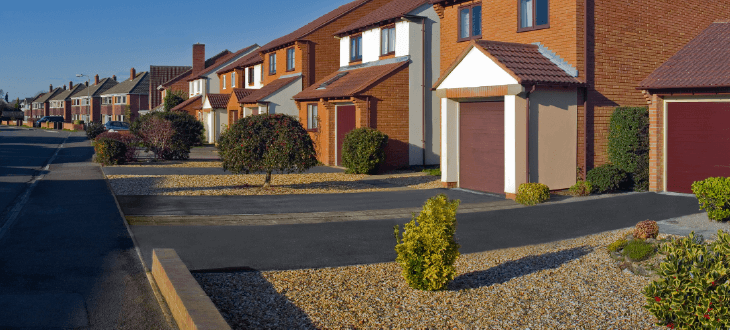
Asphalt is one of the best driveway materials due to its durability, cost-effectiveness, and low maintenance. It is made from crude oil and mixed with either gravel, sand, or other crushed rocks.
This combination allows your driveway to be tough enough to withstand heavy weight while being flexible enough not to crack or bend. This ensures a long lifespan for your driveway, saving on future repairs or replacements.
Asphalt creates a smooth and sleek driveway surface that requires minimal upkeep, reducing the need for frequent repairs or maintenance tasks. Its low maintenance requirements allow you to save time and costs, making it an ideal choice for those seeking a hassle-free and enduring driveway solution.
By performing occasional cleaning to remove debris and resealing every two to three years, you can expect your asphalt driveway to last up to 25 to 30 years, according to Gary McHugh at Asphalt Pavement Solutions.
Choosing an asphalt driveway can lead to cost savings, as prices for the material range from £40 to £70 per m2, which makes it one of the most cost-effective materials alongside gravel. Furthermore, it is simple to install, leading to reduced labour costs.
Costs can vary with asphalt depending on the type you choose. Opting for traditional asphalt will save money initially. In contrast, although more expensive, porous asphalt guarantees good drainage, saving future costs on potential water damage and flooding.
Concrete
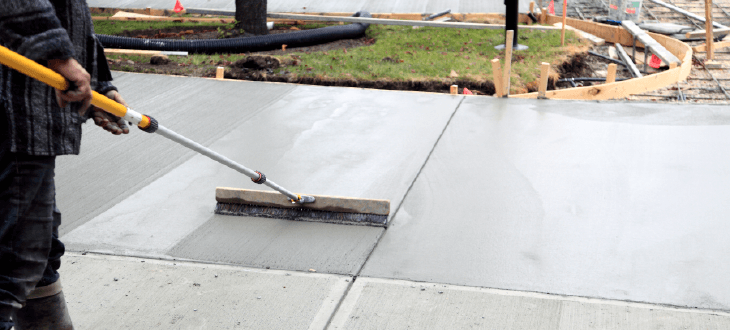
Concrete is one of the best driveway materials. It is budget-friendly, strong, and requires minimal maintenance. Furthermore, its versatility and pleasing appearance make it highly praised.
Concrete is a popular material used globally for building bridges, buildings, and driveways, primarily due to its exceptional ability to withstand heavy weight and can last up to 30 years if maintained properly.
The strength of concrete is due to the tightly packed bonds between the cement and water. According to Gaia Enterprises, concrete is the strongest driveway material available.
Concrete is an excellent material for making a stylish driveway on a budget because its durability does not affect its cost. Flat-poured concrete is the most cost-effective option, producing a sleek and simple finish. The material itself will cost around £20 to £60. If you want to pave a driveway that measures 25m2 and fits one car, the typical cost is estimated to be around £875, according to Property Road UK.
Additional concrete is one of the best driveway materials for being low maintenance. Its smooth finish, similar to asphalt, only requires an occasional sweep to remove debris. The minimal upkeep required for concrete structures results in long-term savings in maintenance costs.
Gravel
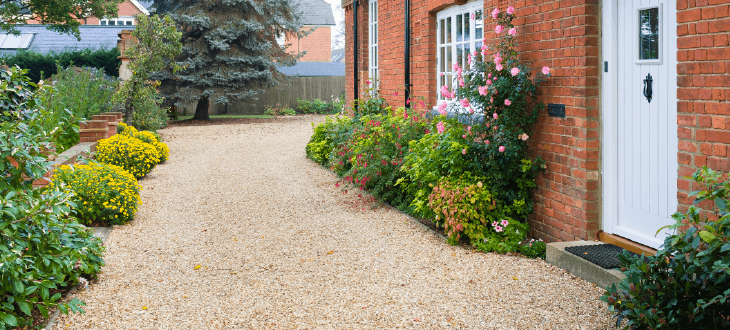
Gravel emerges as the best driveway material for those who are on a budget. Gravel driveways are made of natural materials that are ample in supply and easy to install, making them an accessible option for those who want to upgrade their driveway without breaking the bank.
The cost of gravel can vary depending on the type you choose, but on average, you will expect to pay between £35 to £55 per m2 for the material. On average, a gravel driveway including labour costs will cost £2,500 for a 40m2 driveway according to Price Your Job.
Gravel is an ideal material for durable driveways because it allows movement, which helps prevent the formation of potholes and cracks.
The loose stones shift with changes in the ground, so you won't have to worry about cracks forming on your new driveway. Furthermore, gravel is resistant to hot temperatures and won't crack even in the hottest weather.
Unfortunately, due to the loose stones, maintaining a gravel driveway is more challenging than maintaining asphalt or concrete driveways. In wet climates, the driveway can become muddy-looking, and weeds can grow if a weed barrier is not installed.
Despite these disadvantages, gravel driveways are still relatively easy to maintain. You can simply add more gravel to refresh your driveway.
The minimal repairs required, easy installation, simple releveling when needed and cost make gravel one of the best driveways available in the UK.
Block Paving
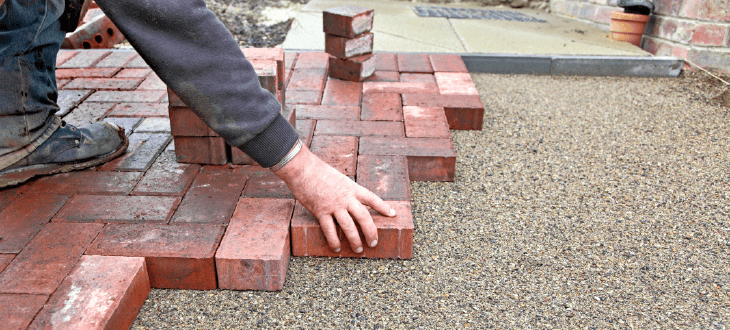
Block paving is a popular driveway option for its durability and minimal maintenance requirements.It is made of sturdy materials like concrete, clay, or natural stone, offering remarkable longevity.
It can last up to 20 to 30 years, according to All Terrain Landscaping and can withstand heavy traffic and adverse weather conditions without significant wear and tear. Its interlocking design ensures structural stability, preventing shifting or sinking over time.
Paving stone driveways are one of the best driveway materials for those who want a reliable and long-lasting entrance to their property.
They can be kept free from debris and stains with minimal effort, ensuring a clean and welcoming look. This resilient option requires hassle-free upkeep, making it an ideal home investment.
However, they are more expensive than other materials like gravel or asphalt. This is because block pavers require considerable time and labour to install. A small driveway using block pavers can cost around £3,500, including labour costs, according to Price Your Job.
Although the initial cost may be higher than other options, block pavers require minimal maintenance and are an excellent long-term investment.
Cobblestone

Cobblestones are an excellent choice for driveways because of their durability. They are made from natural stones like granite, basalt, or limestone, which provide them with inherent strength. This allows them to withstand heavy traffic and last for a long time without showing any signs of wear and tear.
The rugged natural stone and interlocking pattern allow cobblestones to distribute weight evenly, making them suitable for driveways exposed to heavy use and traffic. As a result, cobblestones can last up to 60 years according to True Grid Pavers making them the most durable driveway available.
A cobblestone driveway might seem expensive at first, but due to its longevity, it can be a cost-effective choice in the long run. The cost of a cobblestone driveway is typically between £70 and £130 per square metre, including supply and installation expenses.
They offer long-term savings due to their easy repair. Moreover, the damaged cobblestones can be reused in various projects, reducing material costs and making it an eco-friendly choice.
Cobblestone driveways require more effort to maintain due to the large joints between each stone. However, they are naturally resilient to weathering and heavy traffic, which often means less frequent repairs or replacements.
Ultimately, this results in a reduction of long-term maintenance costs. While cobblestones may require periodic attention to maintain their pristine appearance, their durability and longevity make them one of the best driveway materials.
What is the best driveway surface for cold weather?
Choosing a driveway surface suited to cold weather is essential for ensuring safety, longevity, and cost-effectiveness in regions of the UK prone to freezing. Cold weather can pose significant challenges to driveway materials, such as cracking, and deterioration caused by freeze-thaw cycles.
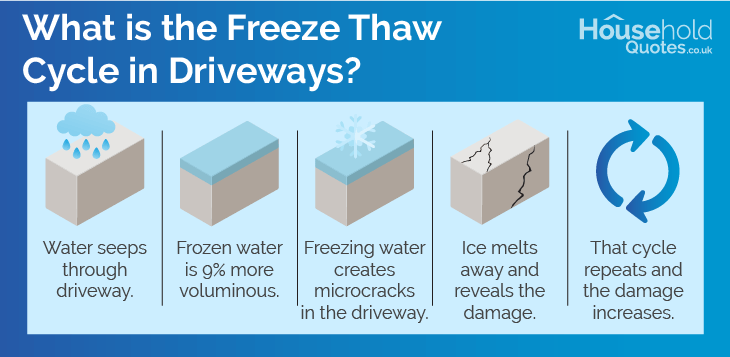
When water seeps into the material and freezes, it expands. When it thaws, the driveway is forced to contract, which can lead to cracks and other damage.
To avoid this, it's best to invest in driveway materials specifically designed to withstand cold climates. By doing so, you can enhance the functionality and aesthetics of your property and increase its overall value.
Additionally, with a driveway surface tailored to cold weather conditions, you can ensure safety and durability throughout the year.
Below are two of the best driveway materials that can withstand cold temperatures
Interlocking Pavers
Interlocking pavers are considered one of the best driveway materials for cold climates. They are resilient against freeze-thaw cycles and harsh winter conditions.
The tightly fitted interlocking units create a flexible and durable surface that can endure the expansion and contraction caused by fluctuating temperatures without cracking or shifting.
Moreover, interlocking pavers are a low-maintenance option during winter months. They can be easily cleared of snow using a shovel without hurting your driveway.
Furthermore, the texture of interlocking pavers ensures that they are slip-resistant during frosty spells, reducing the risk of falls and injuries.
Resin Bound
Resin-bound driveways are another excellent choice for driveways resistant to colder climates and winter temperatures.
Resin-bound driveway surfaces resist freeze-thaw cycles because their soft and flexible material allows for expansion and contraction without cracking.
Unlike other driveway types, such as concrete or asphalt, resin-bound driveways are naturally porous, which allows water to flow through them and prevents water from freezing on their surface.
This feature makes them one of the best driveway materials for reducing falls and injuries during the winter, enhancing safety for you and your vehicles during icy conditions.
Additionally, the smooth and seamless finish of resin-bound driveways makes snow removal easier and more efficient, requiring less effort and minimising damage to the surface.
Best driveway material for drainage
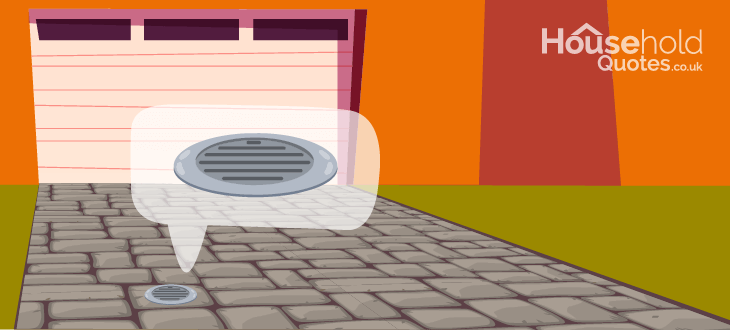
Proper drainage is crucial for ensuring your driveway is functional and lasts long. Lack of adequate drainage can result in erosion, cracking, and even structural damage to your property.
Porous surfaces are the best driveway materials to resolve this issue. They allow water to flow through the surface, which helps to prevent the risk of flooding.
Moreover, choosing permeable pavements for your driveway or parking lot is a sustainable option. Instead of polluting rainwater with oil and other pollutants from your vehicle, permeable pavements allow the water to infiltrate the material.
This helps prevent damage to rivers, lakes, and other water systems due to contaminated rainwater entering the sewage system.
Using porous driveway materials also has the benefit of not requiring planning permission. If your driveway is larger than 5m2 and made of an impermeable material, you need to apply for planning permission and install a drainage system, according to GOV UK.
Porous driveway materials reduce damage to your property and the driveway itself, saving you time and costs on planning permissions. Below are two of the best driveway materials for drainage.
Gravel
Gravel is the best driveway material for drainage. Its naturally permeable surface allows rainwater to infiltrate the ground beneath, reducing runoff and minimising the risk of flooding. This feature not only helps to maintain the integrity of the driveway but also contributes to environmental sustainability by replenishing groundwater reserves.
Additionally, gravel driveways are relatively easy to install and require minimal maintenance compared to other paving materials, making them a practical and budget-friendly option.
Permeable Pavers
Permeable pavers are a modern solution for creating sustainable and porous driveways. Unlike traditional pavers, these are designed with holes so water can easily flow through them. In addition to their environmental benefits, permeable pavers offer versatility in design, as they are available in various shapes, sizes, and colours to suit different aesthetic preferences.
Their durable construction ensures they can withstand heavy traffic and harsh weather conditions, making them one of the best driveway materials for drainage, durability and versatility. They are an attractive choice for you looking to create a sustainable driveway that blends in with the surrounding environment.
Best driveway surfaces to prevent weed growth
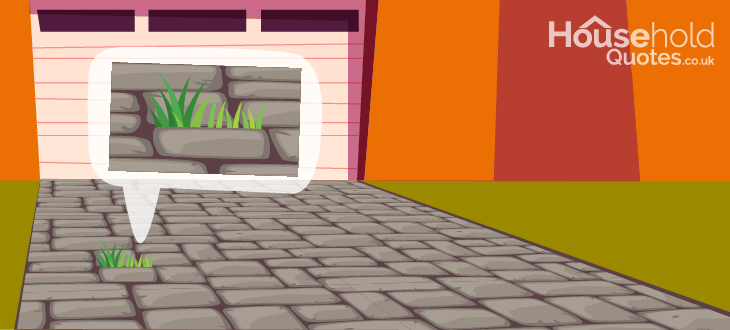
The best driveway surface for weed prevention is one that effectively inhibits weed growth while maintaining durability and aesthetic appeal.
By choosing a driveway that inhibits weed growth, you can reduce the need for regular weeding, saving time and effort in maintenance tasks.
Minimising weed growth allows you to maintain a neat driveway appearance with minimal intervention. Additionally, a weed-free driveway contributes to better curb appeal, enhancing the property's overall aesthetic.
Beyond aesthetics, inhibiting weed growth also helps preserve the driveway surface's structural integrity by preventing weeds from penetrating and causing damage over time. Below is the best driveway for no weeds.
Concrete
Concrete is the best driveway material to inhibit weed growth. Unlike permeable surfaces such as gravel, it is a solid and non-porous surface, which does not provide ideal conditions for weeds to grow.
Due to the smooth surface of concrete, weeds find it challenging to penetrate, which prevents them from establishing a foothold.
Resealing your concrete driveway every 2 to 3 years can create an additional barrier against weed growth. The sealant fills in any pores or cracks on the surface, which helps prevent weed growth.
Overall, concrete's solid and impermeable nature makes it an effective deterrent against weed growth. This results in a low-maintenance and aesthetically pleasing driveway.
Compare multiple quotes to get the best deal on driveway materials
When choosing the best driveway material, compare multiple quotes to get the best deals. When comparing quotes you should consider not only the upfront costs of the materials but also the long-term maintenance and repair expenses.
Some materials may initially cost more but require minimal upkeep, resulting in lower overall expenses in the long run. It's crucial to weigh these factors when making your decision.
When choosing the best driveway material, it is essential to consider the reputation and experience of driveway specialists. A reputable contractor with experience in driveway installations can ensure proper installation and help you avoid future issues.
However, finding quotes by yourself can often be time-consuming and frustrating. This process involves contacting multiple contractors, repeatedly explaining your project requirements, and waiting for responses. This often leads to delays and uncertainties, making it difficult to make an informed decision.
We can remove these challenges at Household Quotes by providing you with four free quotes. Fill out our 30-second form to obtain these quotes and save time and effort.
You can make a more informed decision about the best driveway material for your needs by accessing multiple quotes through Household Quotes. Click below to find out more.
- Describe your needs
- Get free quotes
- Choose the best offer
It only takes 30 seconds

FAQ
The best material to use for a driveway depends on your personal preferences and requirements. Different driveway materials have their own unique advantages and disadvantages. Asphalt is currently the most popular driveway material in the UK due to its durability, low maintenance and cost effectiveness.
Cobblestones are the most durable driveway material due to the natural stones used and their interlocking pattern, which allows them to distribute weight evenly. They have the longest lifespan of all driveway types, and if maintained properly, cobblestones can last up to 60 years.
Concrete driveways are the best driveway materials to avoid weeds, as their smooth finish prevents weeds from growing. Due to its impermeable nature, concrete does not allow water to filter down to the surface, depriving any weed of the water it needs to grow and reproduce.
The strongest driveway material is concrete. Cement and water form tightly packed chemical bonds, creating the strongest material. As a result, concrete driveways can last up to 30 years and withstand heavy weight throughout their lifetime.
Concrete is the most maintenance-free driveway. It is a durable material that reduces the need for repairs and replacements and is also an excellent choice for preventing weed growth. The maximum required maintenance for a concrete driveway is the occasional sweep to remove debris and reseal every two to three years. Undoubtedly, this makes it the best material for low-maintenance driveways.

Caoimhe is an experienced content writer and researcher who is passionate about providing accessible information to every reader. With a background in English literature and Sociology, she combines the two disciplines to create cohesive, well-thought-out, and well-informed pieces.
- What is the best driveway material in the UK
- What is the best driveway material
- 5 best driveway materials based on durability, maintenance, and cost efficiency
- What is the best driveway surface for cold weather
- Best driveway material for drainage
- Best driveway surfaces to prevent weed growth
- Compare multiple quotes to get the best deal on driveway materials
- FAQ
